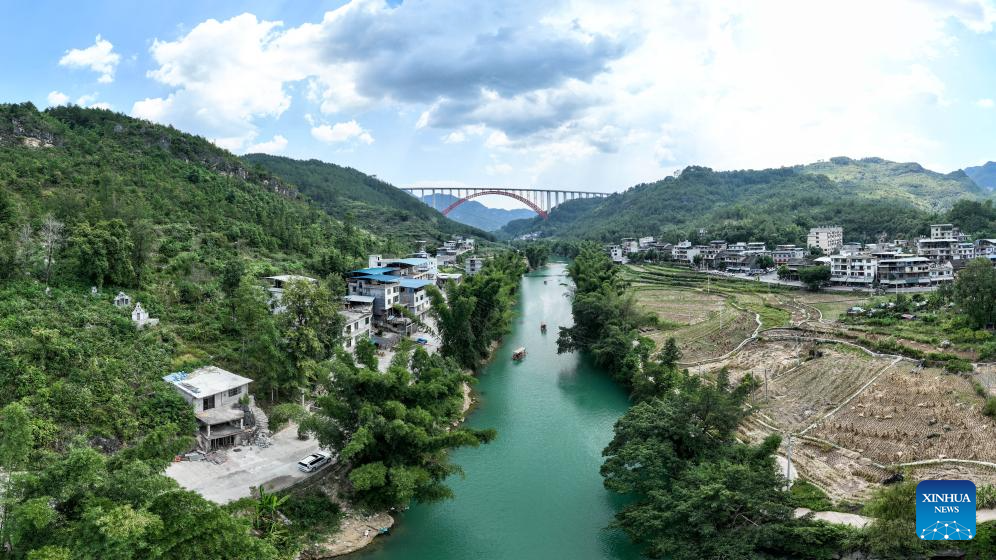
An aerial drone photo shows the Daxiaojing grand bridge on the expressway linking Pingtang and Luodian in southwest China's Guizhou Province, Sept. 5, 2024. Guizhou, with 92.5 percent of its area filled with mountains and hills, has been committed to eliminating bottlenecks in land transportation. Currently, the province has built over 200,000 km of highways, including more than 8,000 kilometers of expressways in operation.
As the country's only provincial region with no plain terrain, Guizhou has garnered many world records by building over 30,000 bridges among its karst mountains. The province is now home to 49 of the world's 100 tallest bridges, and dubbed "the museum of world bridges" due to the vast numbers, various types and complex technologies of these gigantic bridges. (Xinhua/Ou Dongqu)
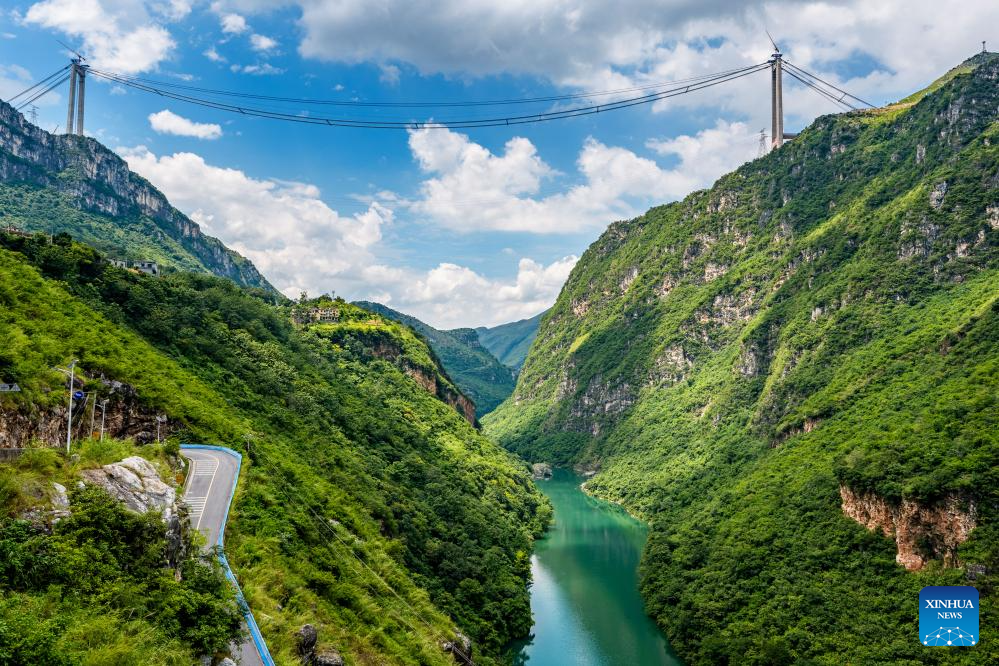
A drone photo taken on Sept. 3, 2024 shows the Huajiang Grand Canyon Bridge under construction in southwest China's Guizhou Province. Guizhou, with 92.5 percent of its area filled with mountains and hills, has been committed to eliminating bottlenecks in land transportation. Currently, the province has built over 200,000 km of highways, including more than 8,000 kilometers of expressways in operation.
As the country's only provincial region with no plain terrain, Guizhou has garnered many world records by building over 30,000 bridges among its karst mountains. The province is now home to 49 of the world's 100 tallest bridges, and dubbed "the museum of world bridges" due to the vast numbers, various types and complex technologies of these gigantic bridges. (Xinhua/Liu Xu)
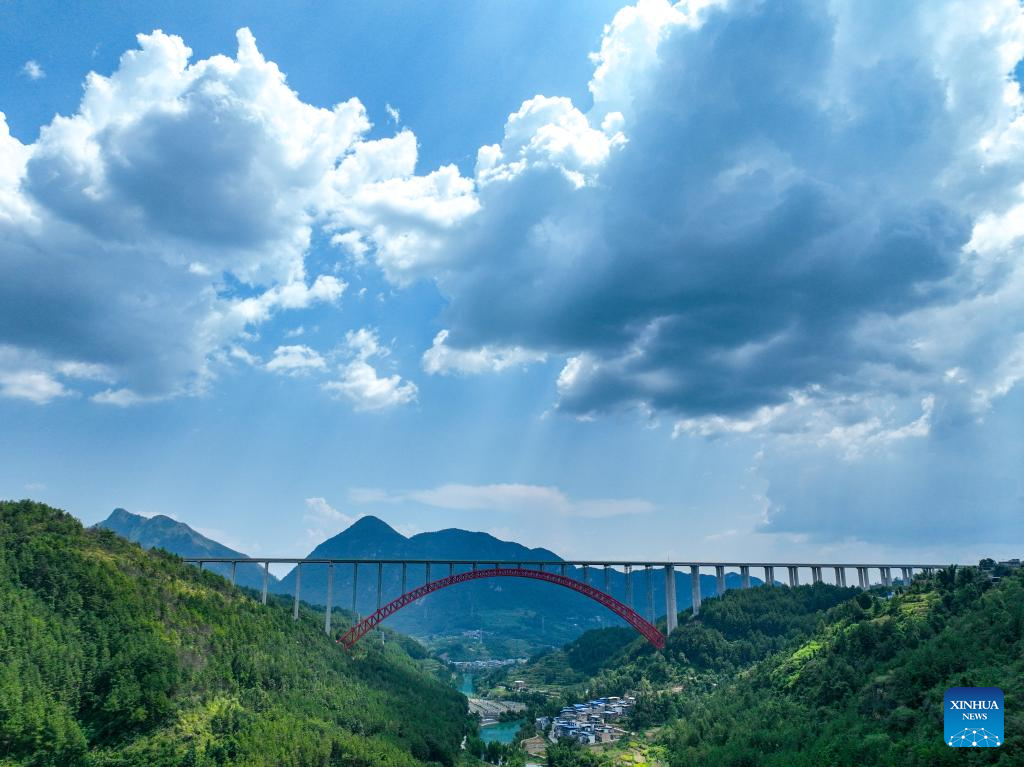
An aerial drone photo shows the Daxiaojing grand bridge on the expressway linking Pingtang and Luodian in southwest China's Guizhou Province, Sept. 5, 2024. Guizhou, with 92.5 percent of its area filled with mountains and hills, has been committed to eliminating bottlenecks in land transportation. Currently, the province has built over 200,000 km of highways, including more than 8,000 kilometers of expressways in operation.
As the country's only provincial region with no plain terrain, Guizhou has garnered many world records by building over 30,000 bridges among its karst mountains. The province is now home to 49 of the world's 100 tallest bridges, and dubbed "the museum of world bridges" due to the vast numbers, various types and complex technologies of these gigantic bridges. (Xinhua/Ou Dongqu)
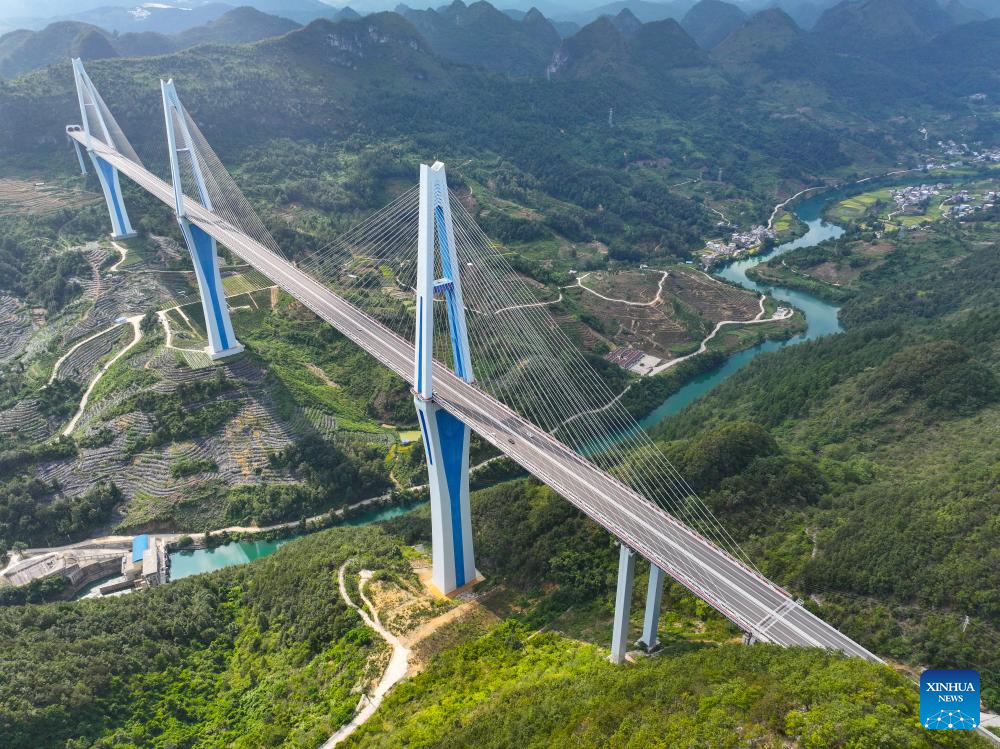
An aerial drone photo shows the Pingtang bridge on the expressway linking Pingtang and Luodian in southwest China's Guizhou Province, Sept. 5, 2024. Guizhou, with 92.5 percent of its area filled with mountains and hills, has been committed to eliminating bottlenecks in land transportation. Currently, the province has built over 200,000 km of highways, including more than 8,000 kilometers of expressways in operation.
As the country's only provincial region with no plain terrain, Guizhou has garnered many world records by building over 30,000 bridges among its karst mountains. The province is now home to 49 of the world's 100 tallest bridges, and dubbed "the museum of world bridges" due to the vast numbers, various types and complex technologies of these gigantic bridges. (Xinhua/Liu Xu)
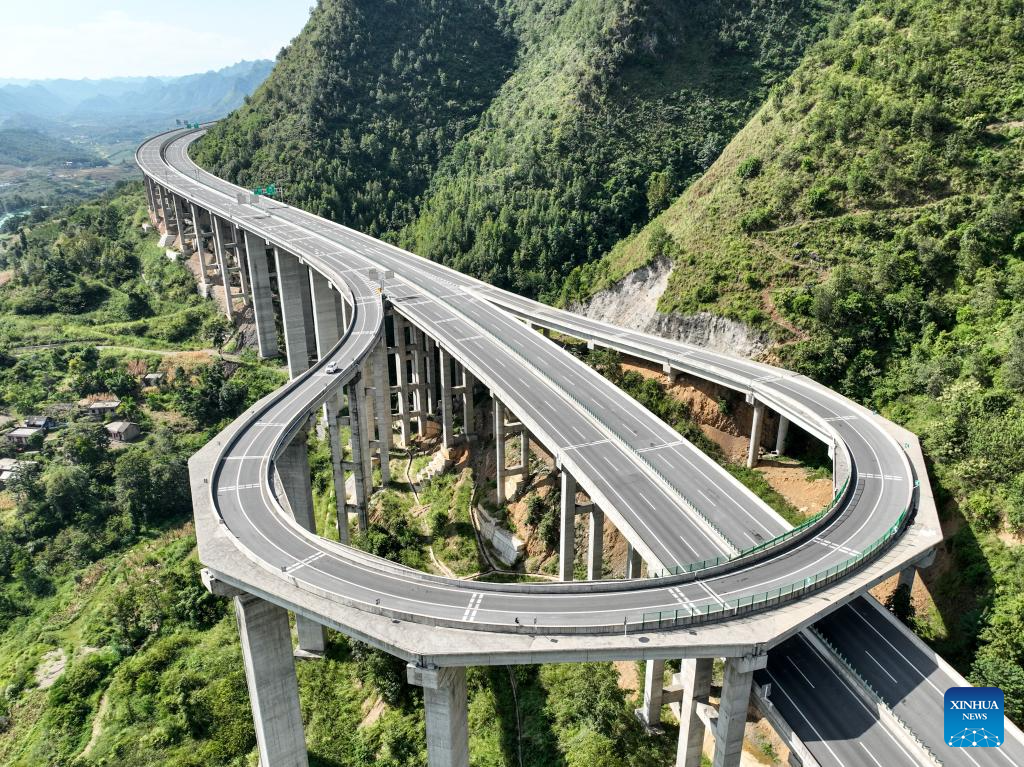
An aerial drone photo shows the Huohua grand bridge on the expressway linking Ziyun and Wangmo in southwest China's Guizhou Province, Sept. 5, 2024. Guizhou, with 92.5 percent of its area filled with mountains and hills, has been committed to eliminating bottlenecks in land transportation. Currently, the province has built over 200,000 km of highways, including more than 8,000 kilometers of expressways in operation.
As the country's only provincial region with no plain terrain, Guizhou has garnered many world records by building over 30,000 bridges among its karst mountains. The province is now home to 49 of the world's 100 tallest bridges, and dubbed "the museum of world bridges" due to the vast numbers, various types and complex technologies of these gigantic bridges. (Xinhua/Ou Dongqu)
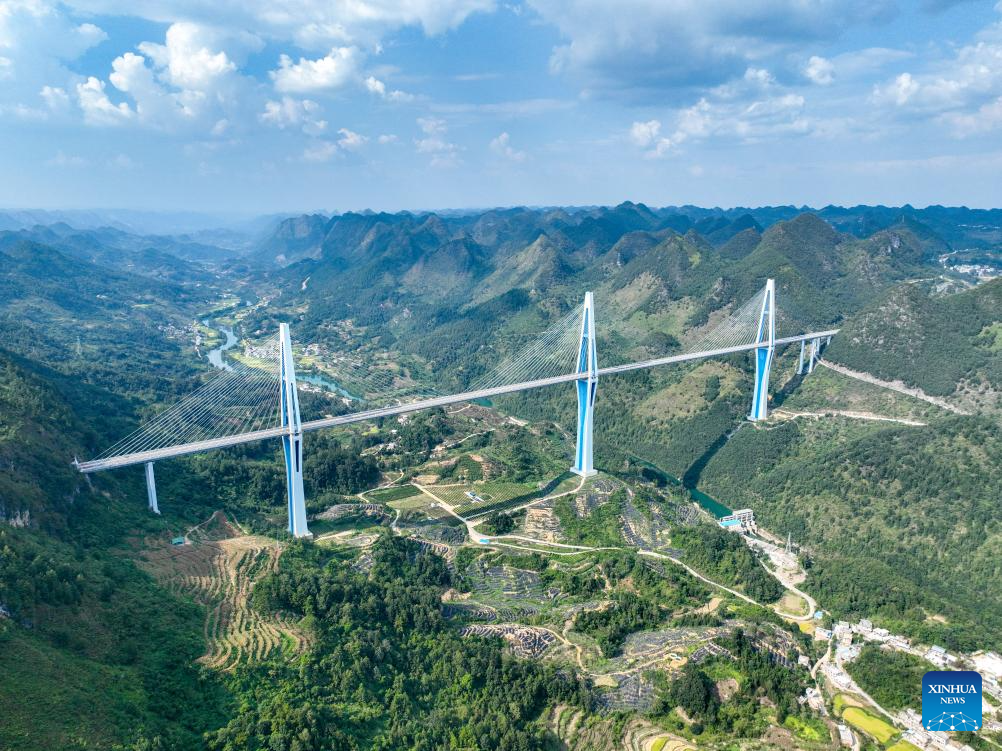
An aerial panoramic photo taken with a drone shows the Pingtang bridge on the expressway linking Pingtang and Luodian in southwest China's Guizhou Province, Sept. 5, 2024. Guizhou, with 92.5 percent of its area filled with mountains and hills, has been committed to eliminating bottlenecks in land transportation. Currently, the province has built over 200,000 km of highways, including more than 8,000 kilometers of expressways in operation.
As the country's only provincial region with no plain terrain, Guizhou has garnered many world records by building over 30,000 bridges among its karst mountains. The province is now home to 49 of the world's 100 tallest bridges, and dubbed "the museum of world bridges" due to the vast numbers, various types and complex technologies of these gigantic bridges. (Xinhua/Ou Dongqu)
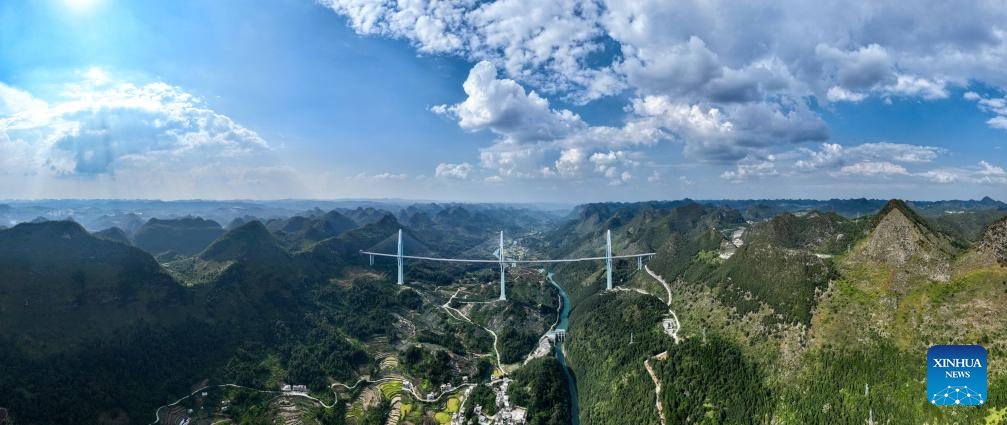
An aerial panoramic photo shows the Pingtang bridge on the expressway linking Pingtang and Luodian in southwest China's Guizhou Province, Sept. 5, 2024. Guizhou, with 92.5 percent of its area filled with mountains and hills, has been committed to eliminating bottlenecks in land transportation. Currently, the province has built over 200,000 km of highways, including more than 8,000 kilometers of expressways in operation.
As the country's only provincial region with no plain terrain, Guizhou has garnered many world records by building over 30,000 bridges among its karst mountains. The province is now home to 49 of the world's 100 tallest bridges, and dubbed "the museum of world bridges" due to the vast numbers, various types and complex technologies of these gigantic bridges. (Xinhua/Ou Dongqu)

An aerial panoramic photo taken with a drone shows the Daxiaojing grand bridge on the expressway linking Pingtang and Luodian in southwest China's Guizhou Province, Sept. 5, 2024. Guizhou, with 92.5 percent of its area filled with mountains and hills, has been committed to eliminating bottlenecks in land transportation. Currently, the province has built over 200,000 km of highways, including more than 8,000 kilometers of expressways in operation.
As the country's only provincial region with no plain terrain, Guizhou has garnered many world records by building over 30,000 bridges among its karst mountains. The province is now home to 49 of the world's 100 tallest bridges, and dubbed "the museum of world bridges" due to the vast numbers, various types and complex technologies of these gigantic bridges. (Xinhua/Ou Dongqu)

An aerial panoramic photo taken with a drone shows the Pingtang bridge on the expressway linking Pingtang and Luodian in southwest China's Guizhou Province, Sept. 5, 2024. Guizhou, with 92.5 percent of its area filled with mountains and hills, has been committed to eliminating bottlenecks in land transportation. Currently, the province has built over 200,000 km of highways, including more than 8,000 kilometers of expressways in operation.
As the country's only provincial region with no plain terrain, Guizhou has garnered many world records by building over 30,000 bridges among its karst mountains. The province is now home to 49 of the world's 100 tallest bridges, and dubbed "the museum of world bridges" due to the vast numbers, various types and complex technologies of these gigantic bridges. (Xinhua/Ou Dongqu)

An aerial panoramic photo taken with a drone shows the Huajiang Grand Canyon Bridge in southwest China's Guizhou Province, Sept. 5, 2024. Guizhou, with 92.5 percent of its area filled with mountains and hills, has been committed to eliminating bottlenecks in land transportation. Currently, the province has built over 200,000 km of highways, including more than 8,000 kilometers of expressways in operation.
As the country's only provincial region with no plain terrain, Guizhou has garnered many world records by building over 30,000 bridges among its karst mountains. The province is now home to 49 of the world's 100 tallest bridges, and dubbed "the museum of world bridges" due to the vast numbers, various types and complex technologies of these gigantic bridges. (Xinhua/Ou Dongqu)



